Click to Skip Ahead
When it comes to small breeds, the Lhasa Apso and Shih Tzu are popular choices. Both breeds are affectionate, have the same type of coats, and average about the same size, so much so that they are often mistaken for one another.
Both breeds are considered ancient and come from Tibet. They both make excellent companion dogs, which is what both breeds were originally bred for in the first place. However, they do have a few differences, and we’ll compare the two breeds so you can determine which breed is right for you and your family.
Visual Differences
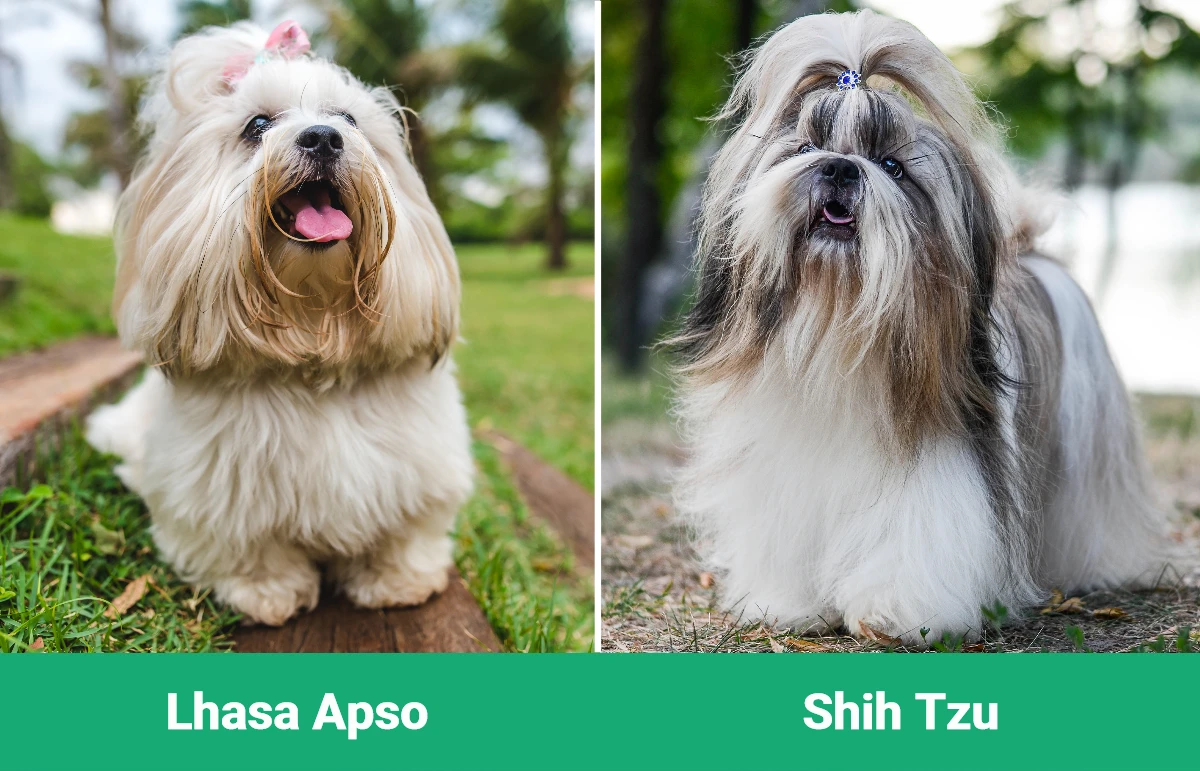
At a Glance
- Average height (adult): 10–11 inches
- Average weight (adult): 12–18 pounds
- Lifespan: 10–15 years
- Exercise: 20–40 minutes per day
- Grooming needs: Moderate
- Family-friendly: Yes
- Other pet-friendly: Potentially with early socialization, but better alone
- Trainability: Intelligent but can be stubborn
- Average height (adult): 9–10.5 inches
- Average weight (adult): 9–16 pounds
- Lifespan: 10–18 years
- Exercise: 20 minutes per day
- Grooming needs: Moderate
- Family-friendly: Yes
- Other pet-friendly: Yes
- Trainability: Requires positive reinforcement and consistency
 Lhasa Apso Overview
Lhasa Apso Overview
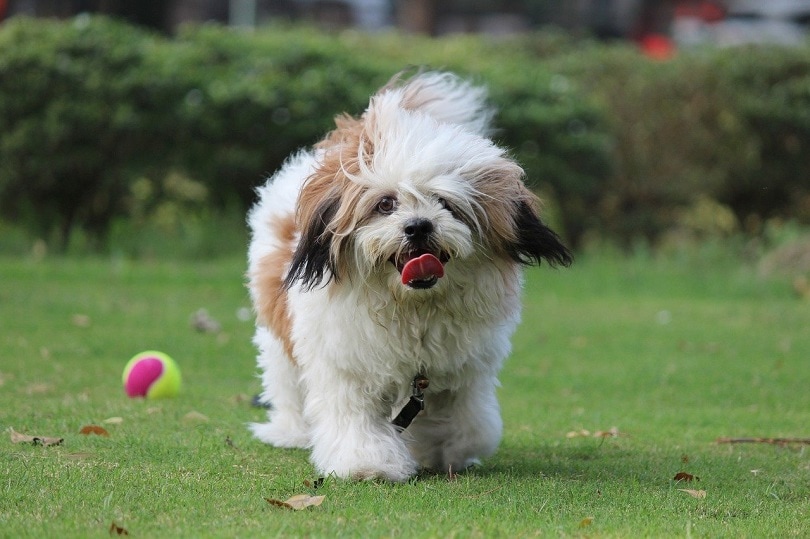
The Lhasa Apso is an ancient breed from Tibet and was well-respected in villages and monasteries. It is believed these dogs have been around since 800 A.D. and lived in isolation with Tibetan Buddhists in the Himalayan Mountains. Lhasa is the capital of Tibet, which is where the first part of the name originated; however, not much is known about where the “apso” part of the name came from.
They are considered excellent watchdogs due to their sharp bark, and they were recognized by the American Kennel Club (AKC) in 1935. These dogs did not come to the United States until 1933 and were bred exclusively in Tibet for centuries. Interestingly, only holy men and nobles were allowed to breed the dogs because the people of Tibet thought they possessed a spiritual quality. Nowadays, many celebrities own Lhasa Apsos.
Personality/Character
The Lhasa Apso breed is smart, confident, comical, and independent. This breed can be a bit stubborn but will form a strong attachment to its owner. These little dogs are affectionate and loyal and make excellent companions. One important fact is these dogs do best being the only dog in the home, but it’s possible to pair them with another dog or other pets with early socialization during puppyhood.
The Lhasa Apso can be aloof with strangers, and they have a sharp bark that will alert you to any strange activity near or in your home, making them excellent watchdogs.
Training
These dogs can be stubborn and do best with obedience training. Positive reinforcement is a must with the Lhasa Apso and keeping the training entertaining will help to prevent your Lhasa Apso from getting bored. They are highly intelligent and can learn basic commands quickly; sometimes, their mindset is equivalent to that of a toddler. They also do best with a reward-based training system involving food and games.
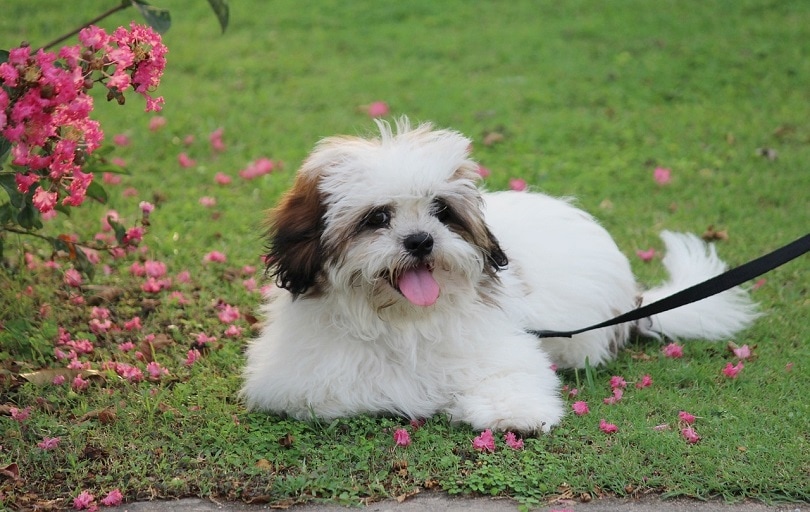
Health & Care
The Lhasa Apso is a relatively healthy breed, but any purebred dog can be susceptible to certain medical conditions. For the Lhasa Apso, one such condition to watch out for is hereditary kidney dysfunction. Kidney problems can occur at an early age, making yearly checkups vital to check the urine for excessive protein. The Lhasa Apso is also prone to brachycephalic airway syndrome.
A dog with this syndrome can have breathing problems due to the structure of their nasal passages and elongated palates. You should avoid hot, humid weather with these little ones, as that type of climate can cause your Lhasa Apso to struggle to breathe.
These little dogs are also prone to liver problems, eye problems, obesity, hip dysplasia, cherry eye, and intervertebral disc disease. The hair around the eyes needs to be regularly trimmed to avoid eye irritation. Keep in mind that not all Lhasa Apsos will develop these conditions, and taking your dog for yearly checkups is key to keeping predisposed medical conditions at bay.
Suitable For:
The Lhasa Apso is suitable for those who are experienced in training stubborn dogs with consistency, as these little dogs may challenge your leadership if not properly trained. They are excellent choices for apartment living, and they can do well with children and other pets if socialized early during puppyhood.
These dogs require moderate grooming and are better suited with someone willing to groom them regularly or take them to a professional groomer when needed.
Shih Tzu Overview
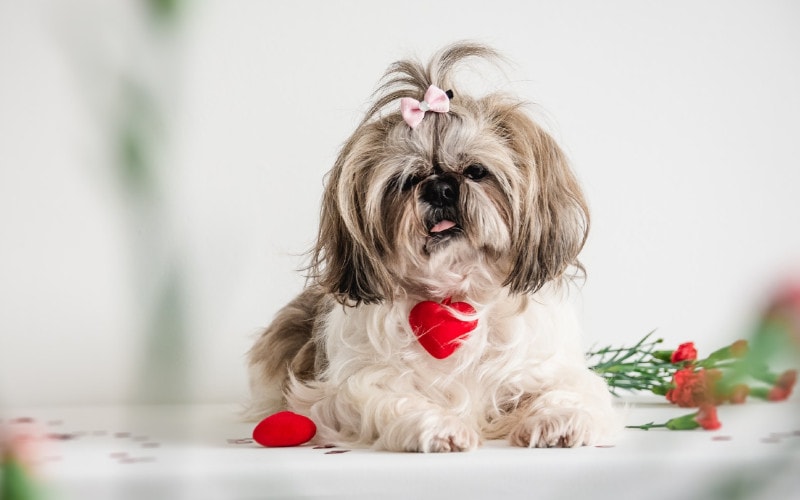
The Shih Tzu was bred to be a companion dog. Like the Lhasa Apso, this ancient breed hails from Tibet, and it’s believed they have been around for 1,000 years. They were often given as gifts to Chinese emperors, and they were often referenced in Chinese artwork and paintings. The name “Shih Tzu” is a Mandarin phrase meaning “little lion.”
The breed was moved from Tibet to China in the 1600s, allowing the Chinese to take over breeding these little dogs. The AKC recognized the breed in 1969. Their long coats are similar to the Lhasa Apso, and they require moderate grooming. You can see this popular dog breed often compete in dog shows.
Personality/Character
The Shih Tzu is a happy-go-lucky little dog that is playful and outgoing. They are affectionate with children and love to be involved in family activities. They are quick to mature and reach adult size in roughly 10 months. These little dogs can become easily spoiled due to their constant need for human interaction, but they make perfect lapdogs. However, be prepared to give your Shih Tzu a large amount of attention daily.
The Shih Tzu is a friendly little dog that will get along with other pets as long as the Shih Tzu has been socialized first. Some Shih Tzus may benefit from having another companion dog in the home, especially if your Shih Tzu has separation anxiety, as another companion will help keep boredom and anxiety to a minimum while you’re away.
Training
Consistency is key in training these little ones. For a successful housetraining outcome, keep your Shih Tzu on a consistent eating, sleeping, and playing schedule. They love training and enjoy learning new tricks because it keeps them at the center of attention, but you’ll need to be consistent with the training routine.
Never use a loud and harsh tone; instead, use positive reinforcement training for these delicate little creatures.
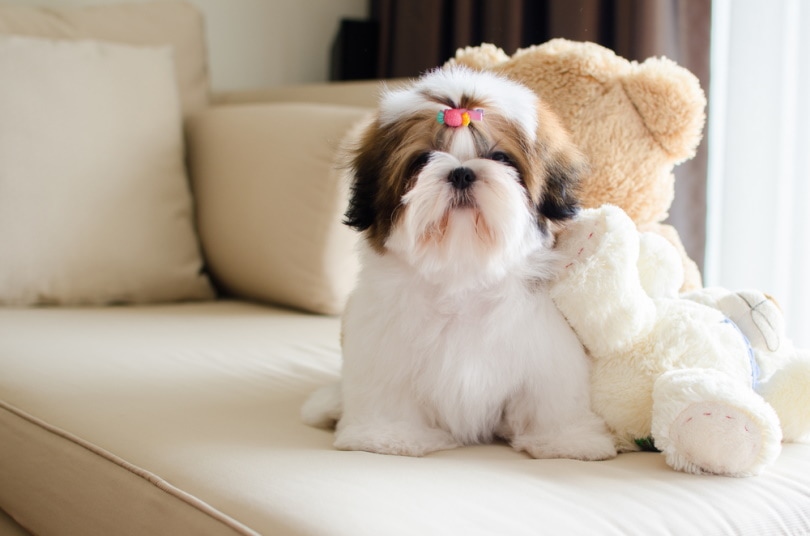
Health & Care
The Shih Tzu is a relatively healthy dog breed, but like in all dog breeds, these little ones are potentially susceptible to certain medical conditions. Like the Lhasa Apso, the Shih Tzu is also prone to brachycephalic syndrome, so you should avoid hot, humid weather for playtime. In regards to the syndrome, common issues for Shih Tzus are a collapsed trachea, stenotic nares (small or narrow nostrils), and an elongated palate.
Other health-related issues are patellar luxation and hip dysplasia. They are also prone to certain eye conditions such as cataracts, progressive retinal atrophy, retinal detachment, and corneal dryness.
As for grooming, the Shih Tzu requires a good deal of maintenance. The long, straight double coat needs daily brushings to keep the hair from matting, but some owners keep the coat short for easier management—however, if left long, the coat needs daily grooming. They, too, need the hair around the eyes regularly trimmed to avoid eye irritation, especially given that they are already prone to eye problems.
Taking your Shih Tzu for regular grooming sessions with a professional groomer is usually the best option for keeping grooming needs up-to-date.
Suitable For:
The Shih Tzu is suitable for any family who wants a friendly little lapdog who loves to be the center of attention. These little ones are outgoing and affectionate and do well with children. If you want to pair your Shih Tzu with another doggie companion, ensure you socialize your doggie first for a positive outcome.
They don’t make good watchdogs because they love humans and will likely greet a stranger with a warm welcome, but these little doggies are fun, free-spirited, and will make an excellent addition to any family.
Which Breed Is Right for You?
As you can see, both breeds have many similarities but also a few differences. The Lhasa Apso is more independent than the Shih Tzu and can be stubborn when it comes to training. They have a sharp bark and are aloof with strangers. On the other hand, the Shih Tzu is friendly, outgoing, and loves humans, even if they’re strangers.
They both have similar medical issues to watch out for, and both require living indoors due to brachycephalic syndrome—which also means no playing in hot, humid weather. They both require regular grooming, and they both can be charming and comical.
So, which one is right for you? To sum it up, if you want more of a watchdog, the Lhasa Apso will be a better choice. If you want a cheerful dog that loves all humans, go with the Shih Tzu. Both dogs make excellent family companions, and you can’t go wrong with either one.
Related Read:
Featured Image Credit: Top – kshitijprakash, Pixabay | Bottom – Castorly Stock, Pexels

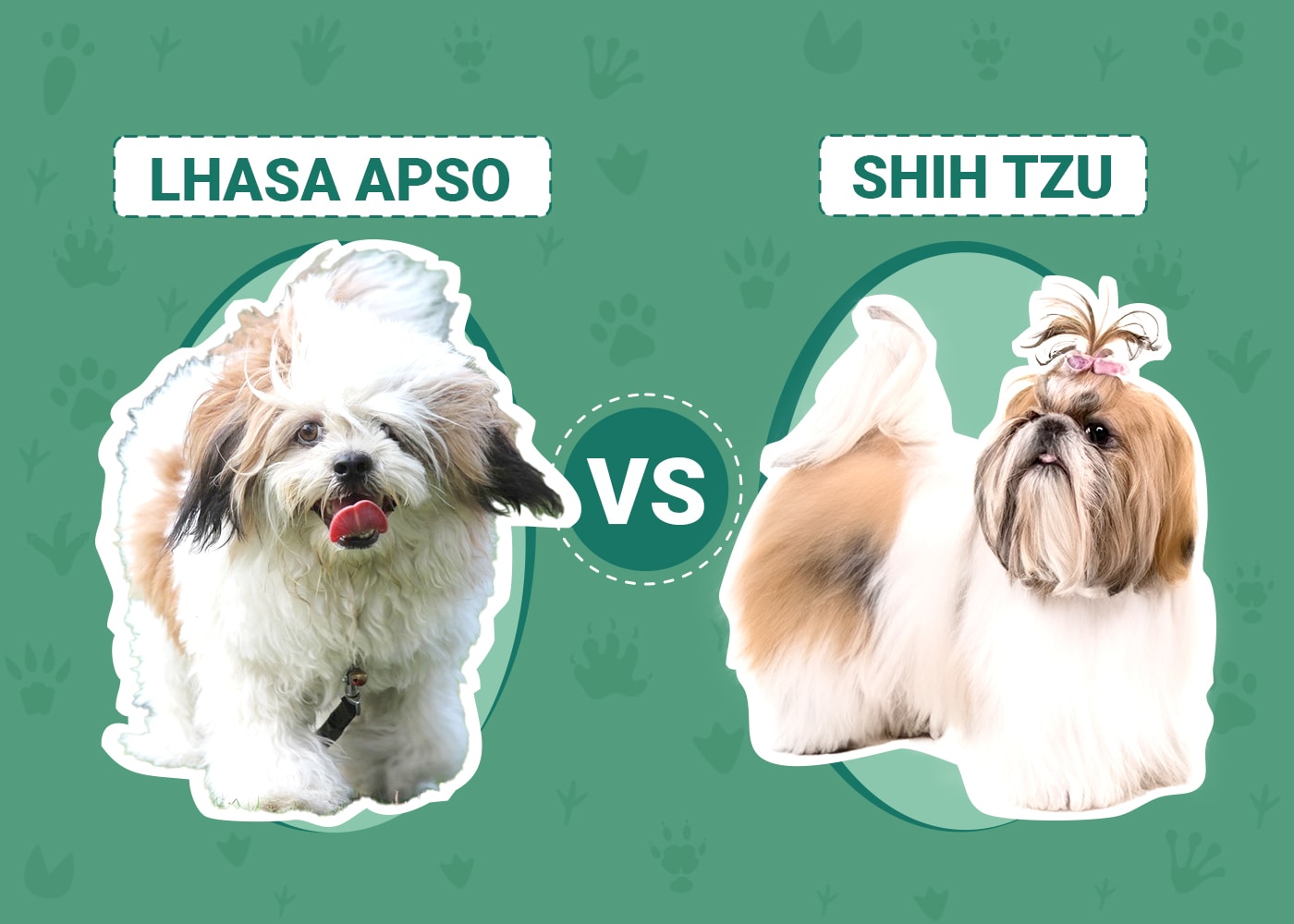
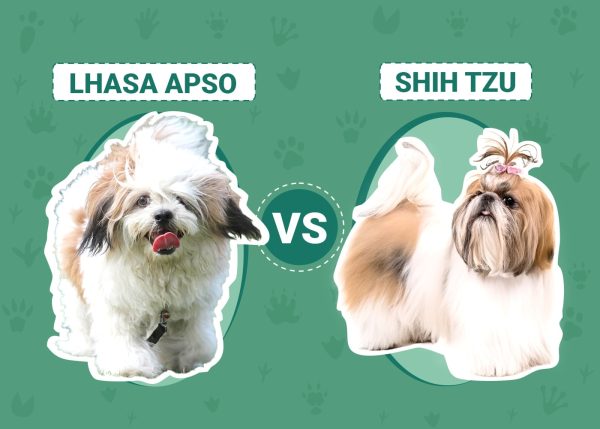

 Lhasa Apso Overview
Lhasa Apso Overview







